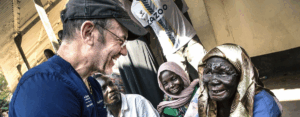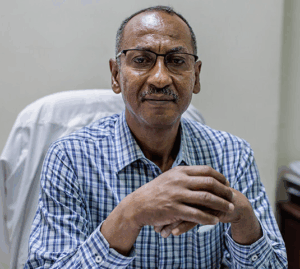Dr. Mona Hanna, a 2025 USA Today Woman of the Year, now directs Rx Kids, providing direct cash assistance to expectant mothers and infants in Flint to address poverty as a root cause of health disparities.

Dr. Mona Hanna, recently named one of USA TODAY‘s 2025 Women of the Year, has built her career around serving children and addressing the root causes that affect their health. The 48-year-old pediatrician and public health advocate first gained national recognition for her pivotal role in exposing the Flint water crisis nearly a decade ago, when her research revealed elevated lead levels in children’s blood after the city’s water source changed.
Born in Sheffield, England to Iraqi scientists who fled during the Baath regime, Hanna immigrated to the United States with her family, settling first in Michigan’s Upper Peninsula before moving to metro Detroit. She completed her education entirely in Michigan, earning degrees from the University of Michigan, Michigan State University, and Wayne State University.
Hanna’s interest in environmental health began in high school when she joined an environmental club that fought against a trash-burning incinerator in Madison Heights. This early activism taught her “the connection between what happens in the environment and people’s health, but also the power of organizing and youth activism,” as she explained in an interview with the Detroit Free Press.
Though she found fulfillment in practicing medicine, Hanna grew frustrated treating conditions that could have been prevented. This led her to pursue additional education in health policy and eventually to create Rx Kids, a program that provides cash assistance to expectant mothers and families with infants in Flint.
Launched in January 2024, Rx Kids gives pregnant mothers a $1,500 lump sum followed by $500 monthly payments for up to 12 months after birth, with no income restrictions. The program has distributed approximately $6.1 million to more than 1,400 families in Flint as of February 2025, and has received $20 million in state budget allocation to expand to additional Michigan communities.
“We have failed to treat the biggest pathogen that makes our kids sick and that’s poverty,” Hanna said in her interview with the Detroit Free Press.
Currently serving as associate dean of public health at Michigan State University College of Human Medicine, Hanna’s career includes numerous achievements beyond the Flint water crisis. She authored the 2018 book “What the Eyes Don’t See,” about her work in Flint, which The New York Times named as one of the 100 most notable books of that year. She has received numerous awards including being named to Time Magazine’s 100 Most Influential People in 2016.
When asked about her guiding principle, Hanna emphasized her commitment to children: “My constituency, my work is children. No matter how hard the work gets or no matter how uncomfortable it gets, I just keep asking myself… is it still kids? That is my North Star, that’s my mantra, my guiding light is what’s best for kiddos. And not just what’s best for them today, but what’s best for them tomorrow,” she said in the interview with the Detroit Free Press.
Read the article by Nushrat Rahman in the Detroit Free Press: Dr. Mona Hanna is among USA TODAY’s 2025 Women of the Year
Watch this video from 2021 about Dr. Hanna:
Related Articles

A Legacy of Health Equity: Agnes Binagwaho Receives Cameron Award
The Cameron Award, from the RCSI School for Population Health, honors Professor Agnes Binagwaho for her transformative work rebuilding Rwanda’s health system and advancing equitable healthcare access in resource-limited settings worldwide.

Dr. Lloyd Williams: A Humble Visionary in Global Ophthalmology
Dr. Lloyd B. Williams, recipient of the 2025 American Academy of Ophthalmology Outstanding Humanitarian Service Award, and long-time volunteer with Cure Blindness Project, embodies selflessness and dedication in his mission to restore sight worldwide.

Steadfast Care Amid Sudan’s Devastation: Dr. Jamal Eltaeb Receives Aurora Prize
Dr. Jamal Eltaeb has been awarded the 2025 Aurora Prize for Awakening Humanity for keeping Al Nao Hospital operating as one of the last functioning facilities in greater Khartoum despite bombardment, shortages, and Sudan’s collapsing health system.


Hi Harry
I can not tell you how my heart jumped for joy when I stumbled on your website.
My name is Samantha Quinlan and I sent you an email yesterday saturday 30th.
I would love to connect with you and to talk about how we could work together on a virtual conference I am working on.
You are an Angel xxx thank you